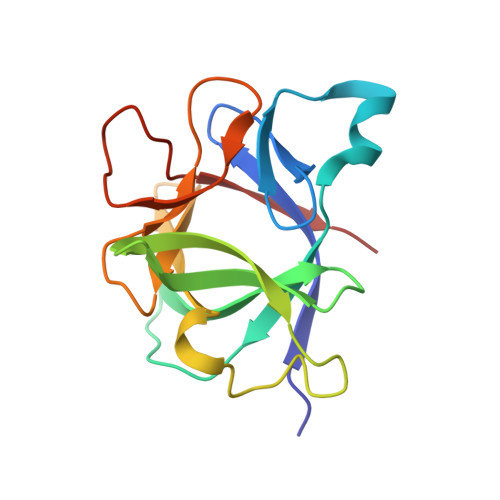Mining the PDB for Tractable Cases Where X-ray Crystallography Combined with Fragment Screens Can Be Used to Systematically Design Protein-Protein Inhibitors: Two Test Cases Illustrated by IL1 beta-IL1R and p38 alpha-TAB1 Complexes.
Nichols, C., Ng, J., Keshu, A., Kelly, G., Conte, M.R., Marber, M.S., Fraternali, F., De Nicola, G.F.(2020) J Med Chem 63: 7559-7568
- PubMed: 32543856
- DOI: https://doi.org/10.1021/acs.jmedchem.0c00403
- Primary Citation of Related Structures:
5R85, 5R86, 5R87, 5R88, 5R89, 5R8A, 5R8B, 5R8C, 5R8D, 5R8E, 5R8F, 5R8G, 5R8H, 5R8I, 5R8J, 5R8K, 5R8L, 5R8M, 5R8N, 5R8O, 5R8P, 5R8Q, 5R8U, 5R8V, 5R8W, 5R8X, 5R8Y, 5R8Z, 5R90, 5R91, 5R92, 5R93, 5R94, 5R95, 5R96, 5R97, 5R98, 5R99, 5R9A, 5R9B, 5R9C, 5R9D, 5R9E, 5R9F, 5R9G, 5R9H, 5R9I, 5R9J, 5R9K, 5R9L - PubMed Abstract:
Nowadays, it is possible to combine X-ray crystallography and fragment screening in a medium throughput fashion to chemically probe the surfaces used by proteins to interact and use the outcome of the screens to systematically design protein-protein inhibitors. To prove it, we first performed a bioinformatics analysis of the Protein Data Bank protein complexes, which revealed over 400 cases where the crystal lattice of the target in the free form is such that large portions of the interacting surfaces are free from lattice contacts and therefore accessible to fragments during soaks. Among the tractable complexes identified, we then performed single fragment crystal screens on two particular interesting cases: the Il1¦Â-ILR and p38¦Á-TAB1 complexes. The result of the screens showed that fragments tend to bind in clusters, highlighting the small-molecule hotspots on the surface of the target protein. In most of the cases, the hotspots overlapped with the binding sites of the interacting proteins.
Organizational Affiliation:
British Heart Foundation Centre of Excellence, Department of Cardiology, The Rayne Institute, St Thomas' Hospital, King's College London, London SE1 7EH, U.K.


















